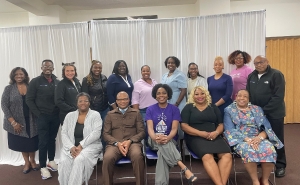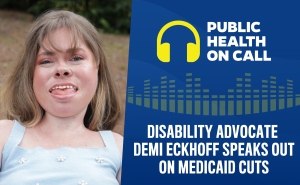Study Reveals Significant Barriers for TGNC Adults Accessing Healthcare in the U.S.
Findings underscore the critical need for healthcare policies that promote inclusivity and equity.

A recent study by Johns Hopkins Bloomberg School of Public Health Department of Health Policy and Management assistant professor Ellesse-Roselee Akre, PhD, MA, published in Health Services Research on July 10, 2024, examines the substantial barriers transgender and gender non-conforming (TGNC) adults face when accessing healthcare in the United States, underscoring systemic challenges that contribute to healthcare disparities within this population.
Conducted between September 2022 and March 2023, the study gathered primary data from 116 TGNC adults through an online survey featuring both open-ended and closed-ended questions. Researchers employed thematic analysis to examine participants’ responses regarding their healthcare experiences, aiming to identify prevalent barriers and themes.
The findings highlight five main themes encapsulating TGNC individuals’ difficulties in healthcare settings: acceptability, accommodation, affordability, availability, and accessibility.
Acceptability emerged as a primary concern, including explicit discriminatory treatment from healthcare providers. Participants reported experiences such as being misgendered, providers refusing to use their patients’ chosen names, and patients encountering overall dismissiveness regarding their gender identity, both in physicians’ offices and at pharmacies. 25% of respondents reported being deadnamed or misgendered, often intentionally, by medical providers and staff. Misgendering involves using pronouns or gendered language that does not align with a person's gender identity, while deadnaming refers to using a name that a TGNC person no longer uses, such as their name assigned at birth. Such instances still occurred even after respondents offered multiple requests for healthcare professionals to respect their chosen pronouns and names. This lack of acceptance not only undermines patient-provider trust but also deters TGNC individuals from seeking necessary medical care.
“When I was hospitalized for a suicide attempt, the doctors and nurses in that particular institution refused to call me by my preferred name and made sure to treat me as female.” -Participant 5
Accommodation challenges were also prevalent, reflecting inadequate medical training about TGNC patient needs among healthcare professionals. Respondents cited instances where providers lacked awareness and sensitivity towards TGNC issues, often necessitating patients to educate their healthcare providers during consultations.
“I had a therapist who told me she was able to write a letter of support [often required by insurance companies and gender-affirming surgeons to ensure patients are mentally prepared to transition]. I saw her for a year and a half and when I asked about it, she told me that she could not give me one, or anyone else, because of her lack of experience with trans clients. This obviously delayed my transition.” -Participant 83
Affordability barriers were another significant theme, with many participants pointing to the prohibitive costs associated with gender-affirming healthcare. A notable concern was the insufficient coverage for essential treatments like hormone therapy under existing health insurance plans, exacerbating financial hardships for TGNC individuals seeking necessary medical interventions.
“I live in Arizona, and the Medicaid here explicitly does not cover gender-affirming surgical interventions. I am told, however, that some people have been able to negotiate, but I don’t have any fight in me to get through this anymore. The system is confusing and it seldom offers help.” -Participant 18
Availability issues were also noted—particularly difficulties in accessing hormone therapy prescriptions. Supply shortages and prescription denials from healthcare providers often exacerbate these issues. This limitation underscores the critical need for improved healthcare infrastructure capable of meeting the specific medical needs of TGNC patients consistently.
“Estradiol valerate [a hormone replacement drug commonly used by transgender women], which I inject weekly, is constantly threatened by supply shortage.” -Participant 18
Lastly, Accessibility was a challenge, centered on the difficulty in obtaining TGNC-specific care at LGBTQ+-affirming clinics. Participants noted geographical constraints and policy barriers that restricted access to gender-affirming medical services, often due to their states’ gender-affirming care bans or severe restrictions.
“Getting access to HRT was the most challenging thing of my transition so far. The nearest Planned Parenthood to me is an hour's drive and they do not provide HRT (hormone replacement treatment) to people in my state, most online services like folx are unable to prescribe HRT online due to my state’s regulations.” -Participant 114
“As healthcare evolves, initiatives to foster a more inclusive and supportive environment for TGNC individuals remain crucial in achieving equitable healthcare access for all,” said Akre.
“Stakeholders across healthcare sectors must continue to prioritize these reforms and ensure that TGNC patients receive the dignified and affirming care they deserve.”
The study has implications for practical changes in healthcare education, policy development, and clinical practices. Recommendations include comprehensive training for healthcare professionals on TGNC healthcare needs, updating electronic health records to reflect patient identities accurately, and expanding health insurance coverage for gender-affirming medical interventions.





